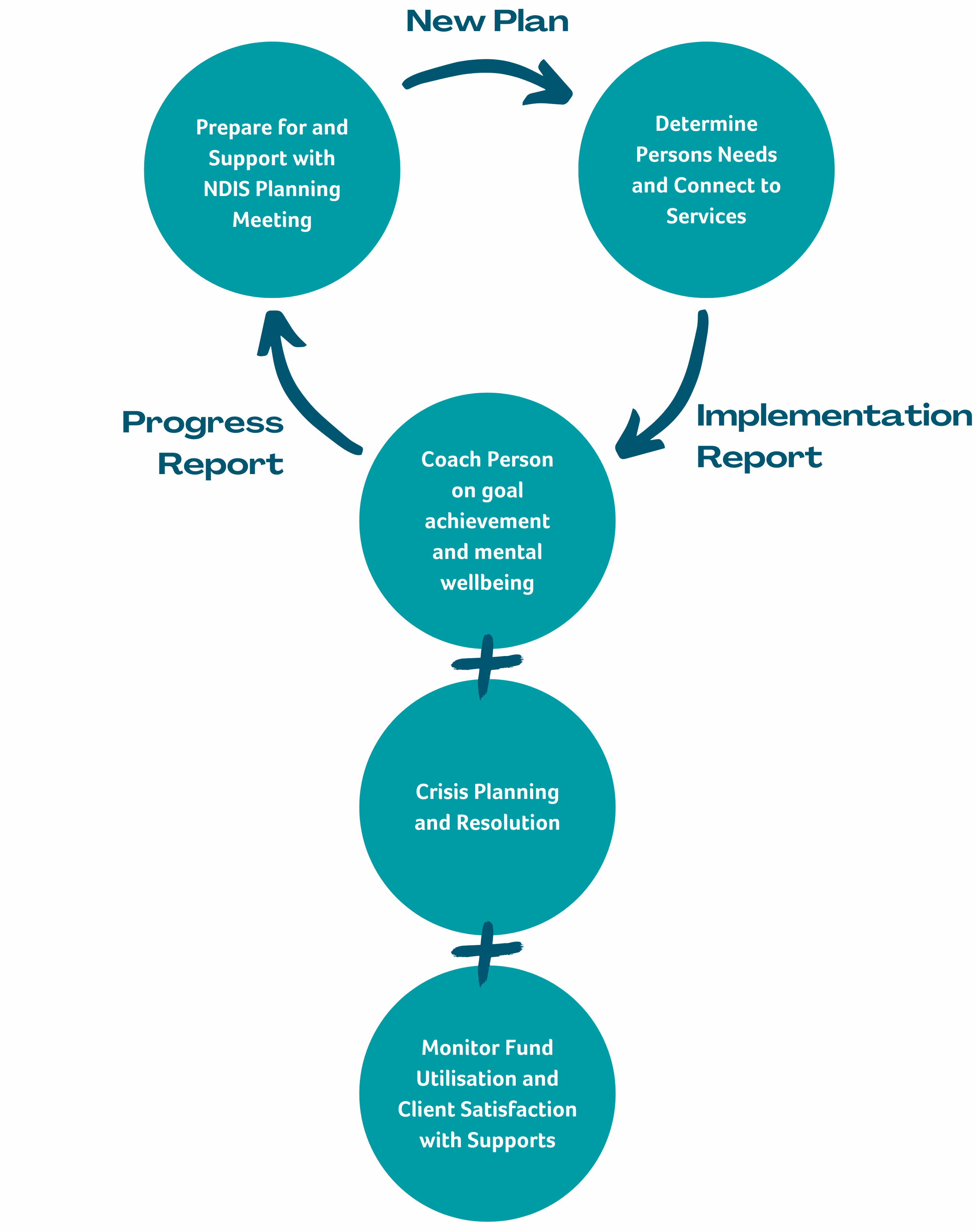What is a Recovery Coach?: Psychosocial Recovery Coaching In Practice
What is a Psychosocial Recovery Coach?
Psychosocial Recovery Coaching is a service that is funded by the National Disability Insurance Scheme (NDIS) under the Capacity Building budget. A Psychosocial Recovery Coach helps an NDIS participant to make sense of their plan and utilise their funding. Recovery Coaches connect participants to the services they require (NDIS and community supports), coach participants to achieve their goals, and prepare for and resolve crisis if it arises. The proportion of how much time is spent on each portion will vary, depending on the client.How is a Psychosocial Recovery Coach Different From a Support Coordinator?
Support Coordinator
Connects the participant to supports.
Facilitates plan utilisation.
Helps Participant navigate the NDIS, community and mainstream supports.
No formal qualification required for Level 2 Support Coordination. Allied Health, Social Work or equivalent degree required for Level 3 (Specialist) Support Coordination
Has general or specialised knowledge of disability and the NDIS
Participants may be given approximately 10-140 hours of funding depending on need.
Supports the participant and carers to build capacity on becoming an informed and empowered consumer; and to advocate for themselves.
Recovery Coach
Connects participant to supports
Facilitates plan utilisation
Helps participant navigate the NDIS, community and mainstream supports.
Minimum Cert IV in Mental Health (or Cert IV in Peer Work) or equivalent
Has general NDIS knowledge and specialised mental health knowledge
Participants are usually given 50 – 100 hours per year
Coaches the participant and carers in goal identification and achievement. This is to improve social, economic and wellbeing outcomes for the person.
Why Psychosocial Recovery Coaching?
The National Disability Insurance Agency (NDIA) recognised that people with mental health diagnoses could benefit from a Support Coordination type service that specialised in mental health knowledge. The NDIA also recognised the value of having a coach who works in a strength based and holistic manner to support a person to identify and attain their goals. Additionally, the NDIS realised the value of those with lived experience of mental distress, thus their inclusion of “lived experience psychosocial recovery coaches”. At Avenues Australia, we have a mix of Lived Experience Recovery Coaches (those with either a Cert IV in Peer Work or other qualification AND lived experience of mental distress) and Recovery Coaches who have a qualification alone. People may engage a Psychosocial Recovery Coach for any combination of the following reasons: For some people, a Psychosocial Recovery Coach is ideal because they are confused by their NDIS plan or are unsure of how to use the plan to connect with services.For others, their goals feel insurmountable, and a coach can help them break the goals into achievable steps.Some people experience crisis on a regular basis and require assistance to prepare and navigate that crisis.Others simply need strategies to manage their mental health or be more organised, connected or productive.
How Does a Psychosocial Recovery Coach Work?
Each Psychosocial Recovery Coaching provider will have their own unique approach to the role, as it is not prescribed by the NDIA. However, the NDIS developed the Recovery Orientated Framework to guide how the service is delivered by providers. This is to allow for flexibility and to encourage innovation in the industry. At Avenues Australia, the following is how we implement psychosocial recovery coaching: -
We meet with you and have a chat to get to know you and what your needs are. We discuss your strengths and the barriers to you living your best life. We then support you in finding providers who meet your specific needs, and help you navigate negotiating terms and signing their service agreements. We write an implementation report (which we call a Recovery Plan) and submit it to the NDIA. We call this stage “Exploration & Planning”.
-
At Avenues Australia we use a toolbox approach to coach clients. This means we have a series of tools (worksheets and activities) that we use with you when appropriate to your situation. Being client-led, however, how we use these tools changes – for some people, we go through the tool together each session; for others, the tools are used to inspire a conversation instead. We call this stage “Connect, Coach & Reflect”.
-
We support you to prepare for anything that could go wrong in your life and figure out who can help you and in which ways, by making a crisis plan. We also help you resolve crises if they come up – helping you put this plan into action. We call this “Crisis Navigation”.
-
We liaise with you and your service providers to ensure you’re getting the most out of your plan without going over budget. We also regularly check in to see how you feel about your supports, and if you’re not enthusiastic about the supports, we help you to change to a new provider. We call this stage “Monitor & Report”.
-
We collate any reports you’ve received over the year and write our own Progress Report to submit to the NDIS. We discuss your progress over the year and any barriers you are experiencing regarding goal achievement. We negotiate if you’d like to add new goals to your next plan and prepare you for the NDIS Planning Meeting. If you would like support during your Planning Meeting, we are happy to be there with you. This also falls under our “Monitor & Report” stage.
If you would like to speak to our friendly team about Psychosocial Recovery Coaching, call us on 1300 208 594, or email hello@avenuesaustralia.com. Alternatively you can submit a Request for Service form by clicking on the link below and we will get back to you shortly.



